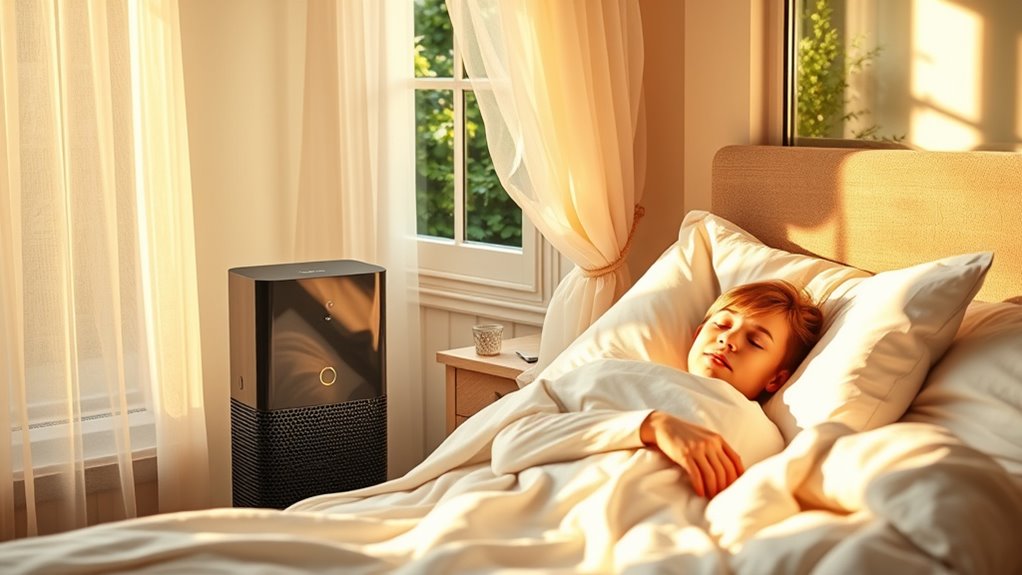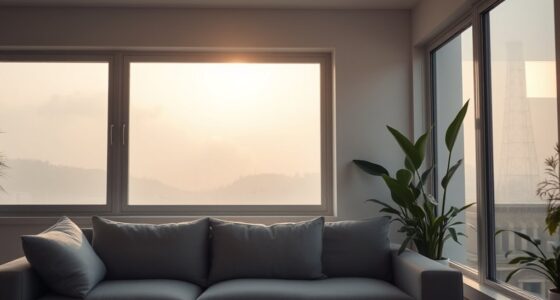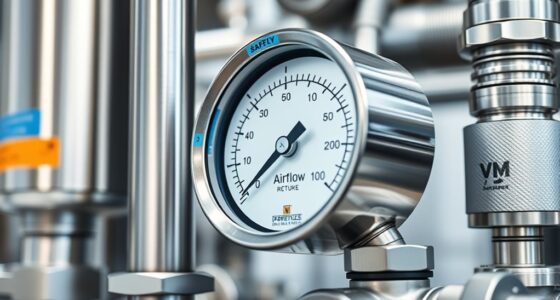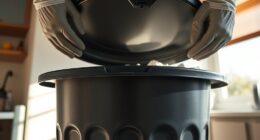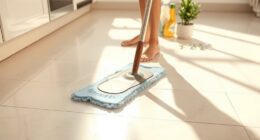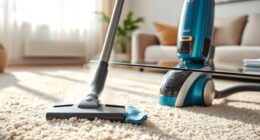Cleaner air can markedly enhance your sleep quality. Air purifiers filter out allergens and irritants, which can help you breathe easier at night. With improved indoor air, you’ll likely fall asleep faster and experience fewer nighttime awakenings. Plus, many purifiers can neutralize odors and create soothing white noise, promoting a peaceful sleep environment. If you’re curious about how to choose the best air purifier for your bedroom and optimize your sleep setup, there’s more to explore.
Key Takeaways
- Improved indoor air quality from air purifiers reduces allergens and irritants, promoting better respiratory health during sleep.
- Users of air purifiers report falling asleep faster and experiencing fewer nighttime awakenings due to cleaner air.
- HEPA filters effectively capture airborne pollutants, ensuring a healthier sleep environment and deeper sleep cycles.
- Odor control and white noise from air purifiers create a peaceful atmosphere conducive to falling asleep quickly.
- Consistent use of air purifiers enhances overall relaxation, supporting recovery and rejuvenation during sleep.
Understanding Air Quality and Its Impact on Sleep
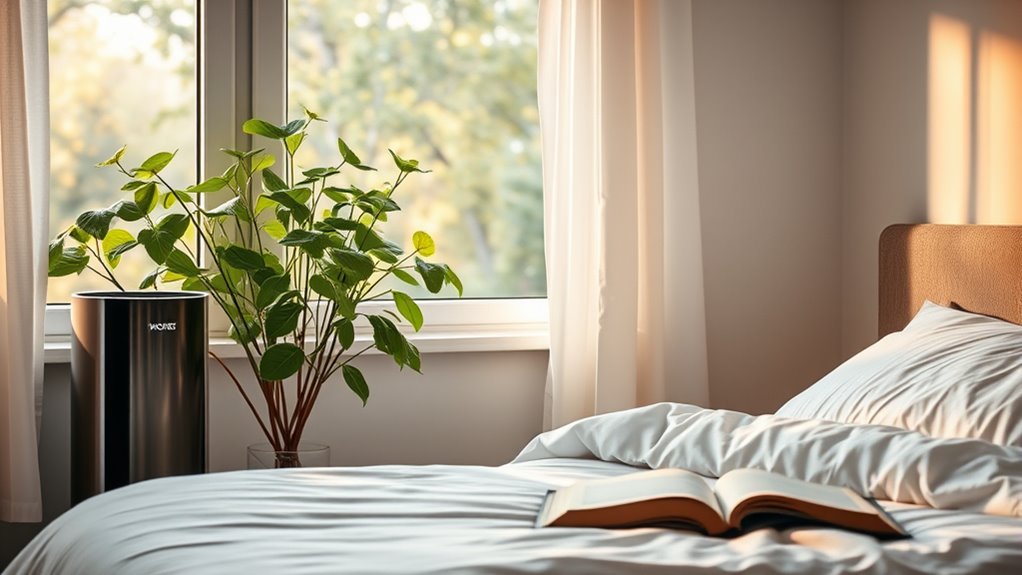
When you consider how essential sleep is to your overall health, it’s alarming to realize that indoor air can be up to 100 times more polluted than outdoor air.
Poor indoor air quality greatly impacts your sleep health, disrupting sleep cycles and affecting respiratory function. Common airborne pollutants like dust, pollen, and volatile organic compounds (VOCs) can lead to congestion and disrupt your ability to fall asleep. Regular use of an air purifier can lead to improved respiratory health, helping you breathe easier during the night. Additionally, studies have shown that clean air can enhance sleep quality and duration, allowing for a more restful night. Furthermore, using a model with smart capabilities can enhance convenience and efficiency in maintaining optimal air quality. HEPA filters, for instance, are highly effective in capturing allergens, ensuring cleaner air for better sleep.
Additionally, these irritants may exacerbate conditions like sleep apnea, making breathing more difficult during the night. Using an air purifier with HEPA filter technology can significantly reduce allergens and improve the overall air quality, promoting better sleep.
Benefits of Using Air Purifiers for Sleep Enhancement
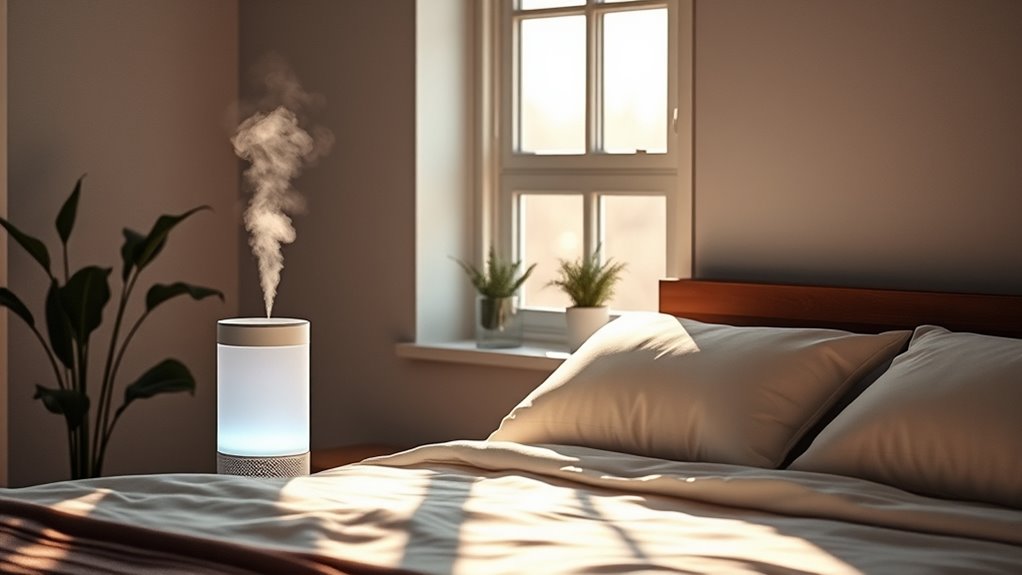
Using air purifiers can dramatically enhance your sleep quality by filtering out common airborne pollutants that disrupt your rest.
An air purifier can help reduce irritants like dust, pollen, and pet dander, leading to fewer allergy symptoms and improved respiratory health. Additionally, regular filter cleaning and replacement is crucial for optimal performance, ensuring continuous air purification. Studies show that individuals using air purifiers fell asleep 20% faster and experienced 11% less wake time after sleep onset. Furthermore, the presence of security systems can contribute to a more relaxed environment, allowing for better sleep. Implementing proper estate planning can also alleviate stress, leading to improved overall well-being. According to research, maintaining proper airflow around the unit enhances air purification efficiency.
Cleaner air environments not only promote deeper sleep but also lower stress hormone production, making it easier for you to drift off. Many users report higher satisfaction with their overall sleep quality, noting fewer nighttime awakenings and a greater sense of restfulness in the morning.
Investing in an air purifier can truly be a game-changer for your sleep. Additionally, consistent maintenance of the air purifier ensures it operates at peak efficiency, providing the cleanest air possible for a restful night.
How Air Purifiers Minimize Allergens and Irritants
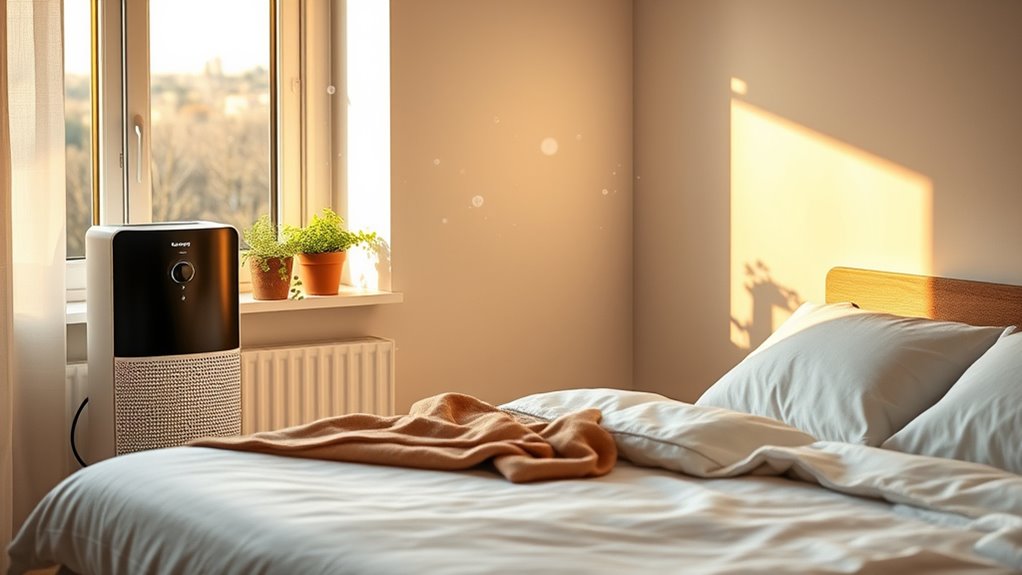
Air purifiers play an essential role in minimizing allergens and irritants that can disrupt your sleep. By using air purifiers, you can enjoy cleaner air and a more restful night.
Here’s how air purifiers can help:
- Trap airborne allergens: HEPA filters capture over 99.97% of dust, pollen, and pet dander.
- Reduce indoor pollutants: They help eliminate both particulate matter and gaseous pollutants, easing allergy symptoms. Additionally, necessary cookies enable basic functionalities on websites, ensuring a smoother online experience related to health and wellness. Moreover, maintaining a consistent budget for purchasing air purifiers can ensure you invest in high-quality options that meet your needs. Engaging in active play can also support respiratory health, making cleaner air even more beneficial for restful sleep.
- Promote better sleep: Studies show an 11% reduction in wake time after sleep onset, leading to fewer disturbances. Additionally, cleaner air can help reduce anxiety and depression symptoms, fostering a more peaceful sleep environment.
With cleaner air, you can experience less stress and a healthier sleep environment, resulting in quicker sleep onset and deeper rest. Additionally, utilizing smart features in air purifiers allows for real-time air quality monitoring, ensuring optimal performance for your sleeping area.
Investing in an air purifier can greatly enhance your sleep quality!
The Role of Odor Control in Sleep Quality
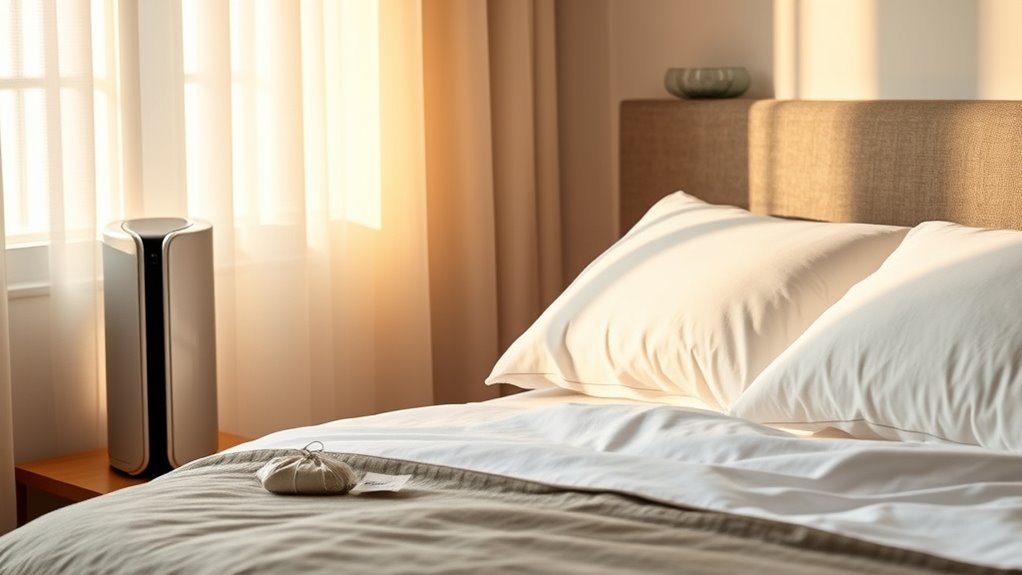
While you mightn’t realize it, unpleasant odors in your bedroom can considerably impact your sleep quality. Odor control is essential for creating a restful environment; lingering smells from pets, tobacco smoke, or cooking can disrupt your sleep by causing discomfort and increasing wakefulness.
Air purifiers equipped with carbon filters effectively neutralize these persistent odors, promoting cleaner air. Regular maintenance of purifiers, including filter changes, is crucial for ensuring optimal performance. Research shows that when the air is free from odor-causing molecules, you’re more likely to fall asleep faster and stay asleep longer. Additionally, heat pumps can also enhance indoor air quality by reducing humidity levels, which further supports better sleep conditions. In cities like Washington D.C., where cultural events can create bustling environments, maintaining a calm atmosphere at home becomes even more crucial for restful sleep.
Furthermore, users of air purifiers report fewer nighttime awakenings, suggesting that improved odor control enhances sleep continuity. By eliminating unpleasant smells, air purifiers not only boost sleep quality but also contribute to a soothing atmosphere for a more restful night. Furthermore, advanced technology helps improve the overall efficiency of air purifiers, ensuring they effectively combat various pollutants. Understanding the importance of emotional regulation can further enhance your overall well-being, promoting better sleep and a healthier lifestyle.
Air Purifiers as White Noise Machines
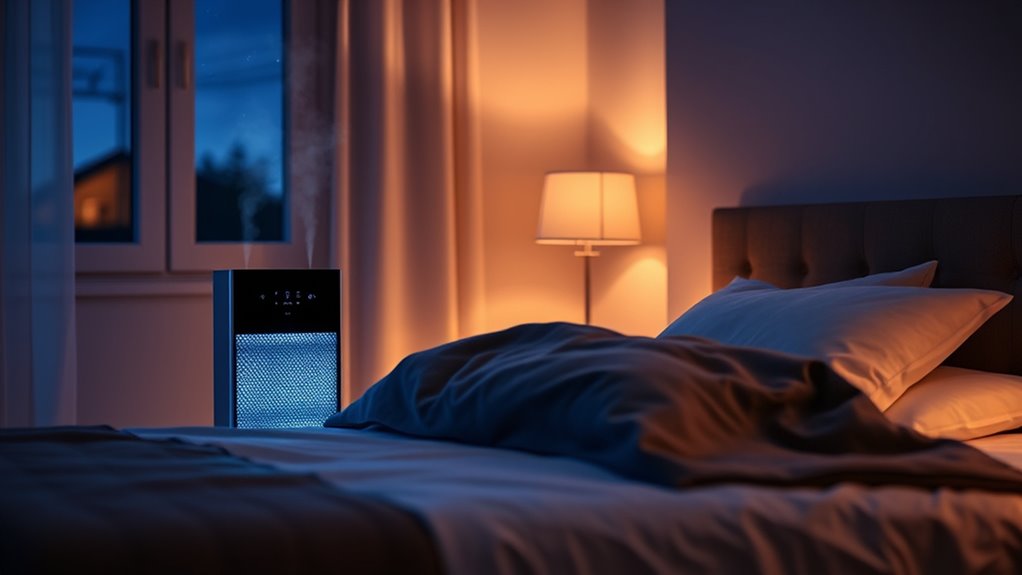
Creating a peaceful sleep environment goes beyond just odor control; the sounds around you play a significant role too. An air purifier can double as a white noise machine, effectively masking disruptive noises that might hinder your sleep quality.
- The subtle hum helps drown out traffic or ticking clocks.
- Consistent exposure to white noise can help you fall asleep faster and stay asleep longer.
- Air purifiers that emit pink noise create a calming atmosphere, enhancing relaxation.
If you’re sensitive to environmental sounds, using an air purifier as a white noise machine can promote deeper sleep. Additionally, maintaining a healthy sleep environment is crucial for improving overall sleep quality.
Not only will you enjoy cleaner air, but you’ll also establish a soothing bedtime routine, leading to better overall sleep health.
Choosing the Right Air Purifier for Your Bedroom
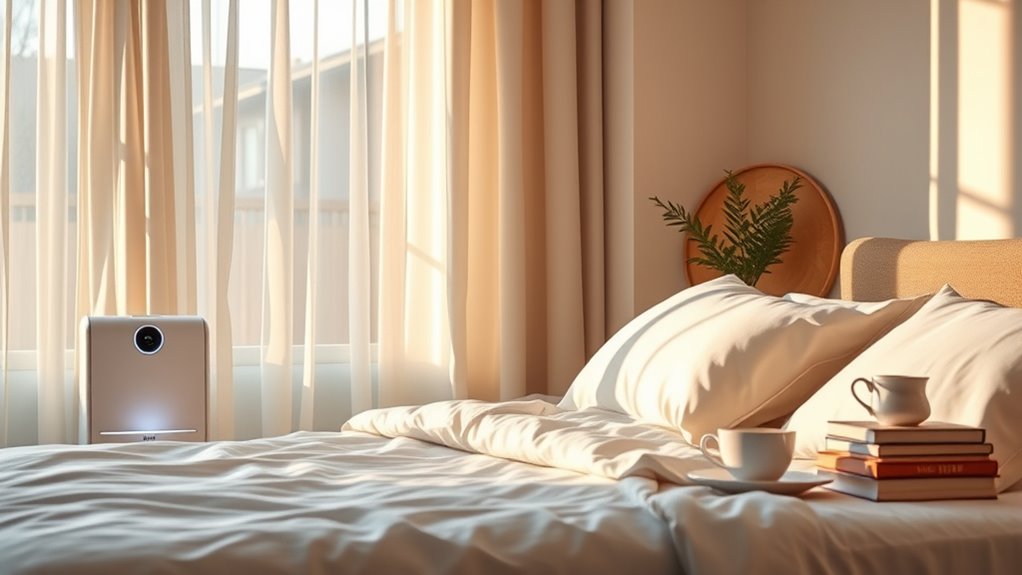
How do you choose the right air purifier for your bedroom?
Start by looking for a bedroom air purifier equipped with High-Efficiency Particulate Air (HEPA) filters, as they trap over 99.97% of airborne particles, greatly improving air quality.
Make sure you select a model that suits your bedroom’s size; check the coverage area specified in product descriptions.
Noise level matters too—opt for purifiers that operate quietly, or emit white noise to mask disruptive sounds.
If odors are a concern, choose an air purifier with activated carbon filters to neutralize unpleasant smells.
Finally, consider features like smart technology or air quality sensors for automated control, guaranteeing a consistently healthy sleep environment.
Additional Tips for a Restful Sleep Environment
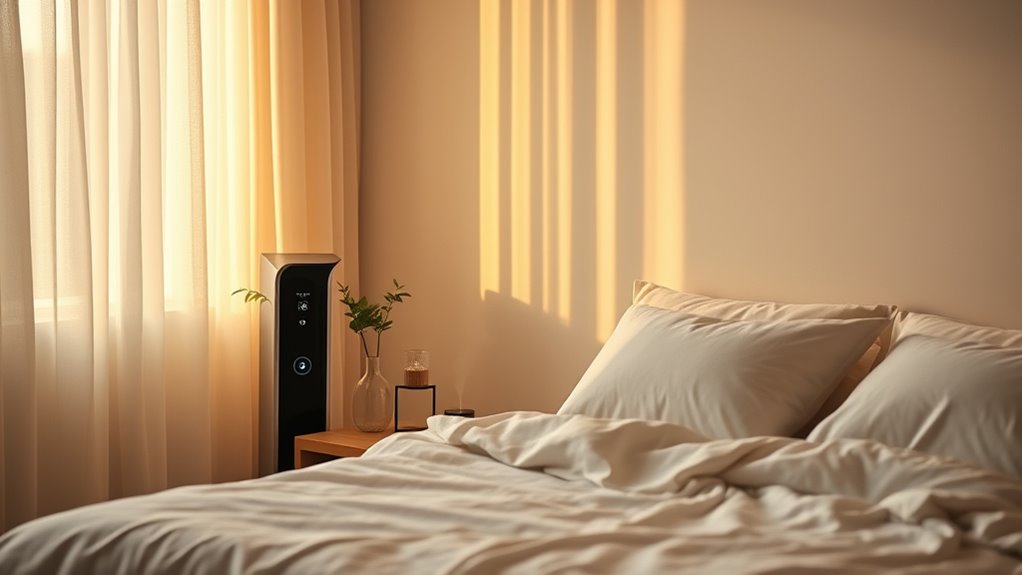
To foster a restful sleep environment, you should consider several elements beyond just an air purifier. Here are some tips to enhance your space:
Creating a restful sleep environment involves more than an air purifier; consider various elements to enhance your space.
- Position your air purifier near allergens, like pets or windows, to maximize clean air.
- Choose a quiet air purifier that creates a soothing white noise, promoting relaxation.
- Incorporate indoor plants to further boost air quality and calm your mind.
Don’t forget to regularly clean or replace your air purifier filters to maintain peak performance.
Use your air purifier continuously, especially before bedtime, to refresh the air and eliminate potential irritants.
Frequently Asked Questions
Do You Sleep Better With Cleaner Air?
Yes, you definitely sleep better with cleaner air.
When your environment’s free from dust and allergens, you’ll find it easier to drift off and stay asleep. Cleaner air helps reduce nighttime awakenings and respiratory issues, allowing for a more restful night.
You might notice fewer allergy symptoms, leading to a more relaxed state. Overall, improved air quality creates a healthier sleep environment, enhancing your overall sleep experience and well-being.
Does an Air Purifier Improve Sleep Quality?
Yes, an air purifier can improve your sleep quality.
By reducing allergens like dust and pet dander, it helps you breathe easier at night. You’ll likely fall asleep faster and wake up less often.
The cleaner air can also minimize respiratory issues, especially if you suffer from conditions like sleep apnea.
Plus, the white noise from the purifier creates a soothing environment, making it easier for you to relax and enjoy a restful night’s sleep.
Do Air Purifiers Really Improve Air Quality?
You mightn’t realize it, but the air in your home could be filled with allergens and pollutants that you can’t see.
Air purifiers really do improve air quality by capturing over 99% of dust, pollen, and pet dander. They also reduce harmful gases like VOCs and eliminate unpleasant odors, creating a fresher environment.
When you breathe cleaner air, you can feel more energized and focused, enjoying your space much more.
Do Air Purifiers Help With Fatigue?
Yes, air purifiers can help with fatigue. By reducing airborne irritants like dust and pollen, they create a cleaner environment that may enhance your sleep quality.
When you breathe easier at night, you’re likely to wake up feeling more rested and less tired during the day. Improved air quality can alleviate allergy symptoms too, meaning you won’t feel as drowsy or exhausted.
Conclusion
Incorporating an air purifier into your sleep routine can truly make a difference. Cleaner air not only helps you breathe easier but also promotes deeper, more restful sleep. Remember, “a good night’s sleep is a key to a good day.” By minimizing allergens, controlling odors, and even providing soothing white noise, you’re setting the stage for better rest. So, invest in the right air purifier and enjoy the benefits of cleaner air for a rejuvenating night’s sleep.
